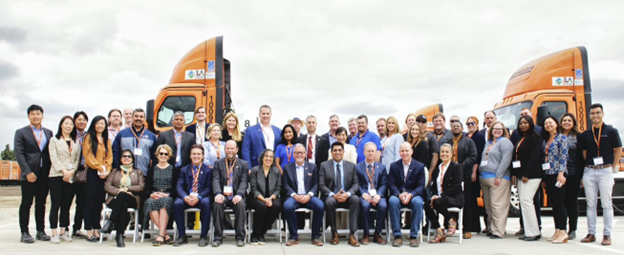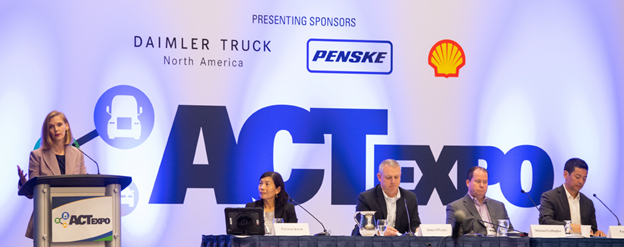
Joint Electric Truck Scaling Initiative (JETSI)
Contact
Advanced Technology Demonstration and Pilot Projects


South Coast Air Quality Management District

August 2021 – March 2025
Project Details:
With the availability of commercial, CARB certified Class 8 battery electric trucks (BETs), it is important to understand the feasibility of large scale truck deployments within a single fleet. JETSI is one of the first pilot projects funded in California which provides fleets with concrete guidance and lessons learned to successfully deploy 50 BET and infrastructure at scale and enable fleets to transition to zero emission technologies. BETs in this project will have a minimum daily range of at least 150 – 200 miles on a single charge and most trucks will be in drayage service, with some in short regional haul service. Ancillary support services such as networking software for charger management, demand response, and fleet uptime and reliability, complete BET maintenance service plans, as well as solar and energy storage to offset demand charges, will enable fleets to utilize these trucks to meet revenue service needs.
South Coast Air Quality Management District (South Coast AQMD) is leading a regional collaborative with the Mobile Source Air Pollution Reduction Review Committee (MSRC), Southern California Edison (SCE), Port of Long Beach, and Port of Los Angeles to deploy 100 BETs for drayage and regional haul service. Fleet partners National Freight Industries (NFI) will operate 50 trucks in drayage operations, and Schneider will operate 50 trucks in regional haul (30) and drayage (20) operations. NFI will install 1 MW solar and 4 MWh battery energy storage.
Grantee:
South Coast Air Quality Management District
Partners:
Funding from MSRC, Port of Los Angeles, Port of Long Beach, SCE, NFI, Schneider, Daimler, Volvo, Electric Power Research Institute, CALSTART, University of California Riverside, LA Cleantech Incubator (LACI), Coalition for Clean Air, California Energy Commission, Electrify Commercial, Power Electronics, Gladstein, Neandross & Associates (GNA), Rio Hondo College and San Bernardino Valley College.
Grant Amount
| CARB Contribution | $16,019,316 |
|---|---|
| CEC Contribution | $10,964,955 |
| Matching Funds | $39,522,684 |
| Project Total | $66,506,955 |
Vehicles/Equipment Funded
100 Commercial CARB certified Class 8 battery electric trucks (BETs) and infrastructure deployed at freight handling facilities:
- 50 BETs each at NFI (Ontario) and Schneider (South El Monte)
- 19 350 kW DC fast chargers at NFI and 16 350 kW DC fast chargers at Schneider https://vimeo.com/blackveatch/review/839136747/042732a3a2
- 1 MW solar, 4 MWh battery energy storage, BET maintenance facility at NFI
Featured innovations:
- Multiple truck configurations to meet drayage/regional haul applications and range
- Increased energy density battery chemistry for later model year BETs
- Solar, energy storage, and second life batteries to mitigate grid impacts and energy costs
- Networked chargers with fleet management software
- EPRI to develop fleet uptime software to maximize charger utilization/uptime
Lessons Learned
- Complexity of utility regulatory policies and regulation requirements which do not fund deployment of microgrid technologies such as solar or energy storage under infrastructure incentive programs such as SCE’s Charge Ready Transport
- Cost of grid upgrades, solar and storage, temporary power, and IBEW labor add significantly to the cost of large scale infrastructure projects
- Resolving challenges for fleets to deploy infrastructure, solar, and storage at scale will require input and coordinated effort of multiple agencies such as CPUC, utilities, CEC, CARB and air districts to avoid infrastructure delays
- Any future statewide infrastructure incentive program should be designed to allow grid upgrades, solar and storage, and temporary power as eligible costs
- Coordination with utilities, cities, and equipment manufacturers on infrastructure deployment critical due to long lead times and required approvals
- Challenges in aligning infrastructure deployment with BET deliveries at fleets
- Phasing in construction activities to minimize disturbance to fleet activities
Status Updates
- Schneider BET and infrastructure deployment completed in June 2023
- Schneider hosted a media event on June 7, 2023 with input from public agencies South Coast AQMD, CARB, CEC, and MSRC
- NFI BETs partially deployed. Phase 1 temporary power charging to be completed in August 2023. Phase 2 permanent power charging to be completed March 2024
- Ricardo is collecting baseline and BET data for Schneider and NFI trucks
- CALSTART is developing infrastructure data collection plan
- Surveys developed for ZEV workforce plan
- Students from Rio Hondo and San Bernardino Valley College visited ACT Expo Hall and trade booths hosted by Daimler, Electrify America, NFI, and Schneider. Four students have subsequently received jobs from project partners
- Outreach to residents by Coalition for Clean Air and stakeholder workshop hosted by LACI in June 2023 to communicate technology and economic benefits in disadvantaged communities
- UCR to develop eco-routing for BETs
Videos & Other Media
- Schneider Media Event

- JETSI Project Overview at ACT Expo 2023
- https://www.jetsiproject.com/video/jetsi-hosts-student-tours-at-act-expo-2023




